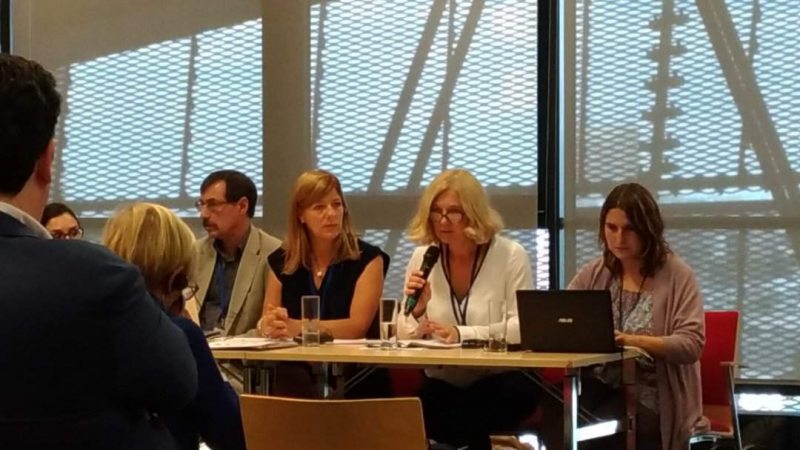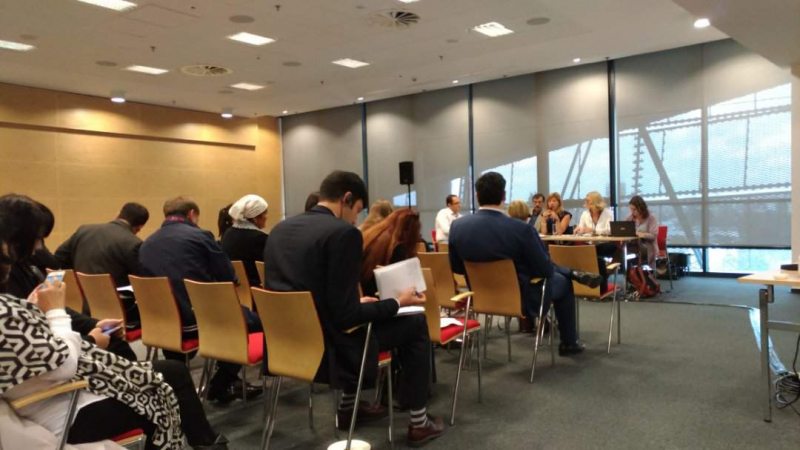Persecution of civil society and pressure on lawyers on the agenda of HDIM 2017

A side event involving human rights defenders from the post-Soviet countries within the OSCE Human Dimension Implementation Meeting. Warsaw, 19 September 2017
A number of side events within the framework of the OSCE Human Dimension Implementation Meeting held in Warsaw deal with acute problems related to the work of human rights defenders in the post-Soviet region. The international community has been urged to address the issue of pressure on lawyers and the politically motivated persecution of civil society groups in Belarus.
A side event under the title “The Danger of Speaking Out —Recent Trends in the Post-Soviet Space” was organized on September 19 by IPHR (International Partnership for Human Rights) and brought together human rights defenders from Belarus, Moldova, Kazakhstan, Kyrgyzstan and Armenia. Belarus was represented by Tatsiana Reviaka, president of the Barys Zvozskau Belarusian Human Rights House and activist of the Human Rights Center "Viasna". She noted that all of the problems mentioned by her colleagues from other countries are also relevant for Belarus.
“Yevgeniy Zhovtis of the Kazakhstan International Bureau for Human Rights and Rule of Law, spoke about one of the trends: in countries where there is no political opposition (eliminated, marginalized or not yet formed), the government attacks the civil society — activists, human rights defenders, journalists, bloggers, independent trade unions. As you can see, this suits Belarus, too,” Reviaka said.
“I also learned that in recent years in Armenia and Moldova the authorities have increased pressure on lawyers who defend people facing politically motivated charges, and cases relating to human rights. There are no cases of deprivation of licenses, which we have seen in Belarus, but in Moldova they even open criminal cases against lawyers. The overall trend in these countries is the identification of lawyers with their clients.”

- Participants in the side event. Left to right: Yevgeniy Zhovtis, Brigitte Dufour, Tatsiana Reviaka, and Julia Votslava
In her speech, Tatsiana Reviaka told about the recent developments in Belarus. She said that earlier this week a court in Minsk dismissed the claim of 12 Belarusian human rights defenders to oblige the Interior Ministry to reduce the term of expulsion for Alena Tankachova, head of the Center for Legal Transformation Lawtrend. A week ago, the Justice Ministry revoked the license of lawyer Hanna Bakhtsina, who defended activists accused in politically motivated cases and cases relating to the protection of human rights. She also spoke about the politically motivated prosecution of representatives of the REP independent trade union and the presence of three political prisoners: a representative of the independent trade union Ihar Komlik, social activist Dzmitry Paliyenka and human rights activist Mikhail Zhamchuzhny.
“This year it has been six years since the publication of the report prepared by the OSCE Rapporteur on the situation of human rights in Belarus in the framework of the Moscow Mechanism. The report was not only a qualitative analysis of the human rights crisis that began in late 2010, but also included a number of key recommendations to overcome the crisis and aimed at systemic changes that would guarantee the impossibility of a recurrence of such crisis situations,” Reviaka said. “Unfortunately, most of the recommendations, both short-term and those aimed at systemic changes, remained unimplemented. The government fully preserved all the repressive instruments that are activated in moments of political expediency.”
The human rights activist noted that the event caused a great interest of the public. It was visited by members of the official delegations of Armenia and Kyrgyzstan, who tried to fend off the speakers’ presentations. At the same time, the wife of political prisoner and human rights activist Azimzhan Askarov sentenced to life in prison in Kyrgyzstan, thanked everyone for their attention to the fate of her husband and family.
Today, human rights activists continued to raise serious problems. At a side event entitled “Lawyers Need Legal Protections too: Human Rights Lawyers Working in Challenging Environments”, representatives of non-governmental organizations of Kazakhstan, Crimea, Tajikistan, Turkmenistan and Uzbekistan discussed the importance of the work of lawyers in conditions of intimidation, hindrance and government interference. The situation in Belarus has been described by Olga Salamatova, legal expert of Helsinki Foundation for Human Rights, which was one of the organizers of the event. The participants worked out recommendations for the international community to improve the mechanisms of protecting lawyers and preservation of independence of the legal profession as a whole.


















